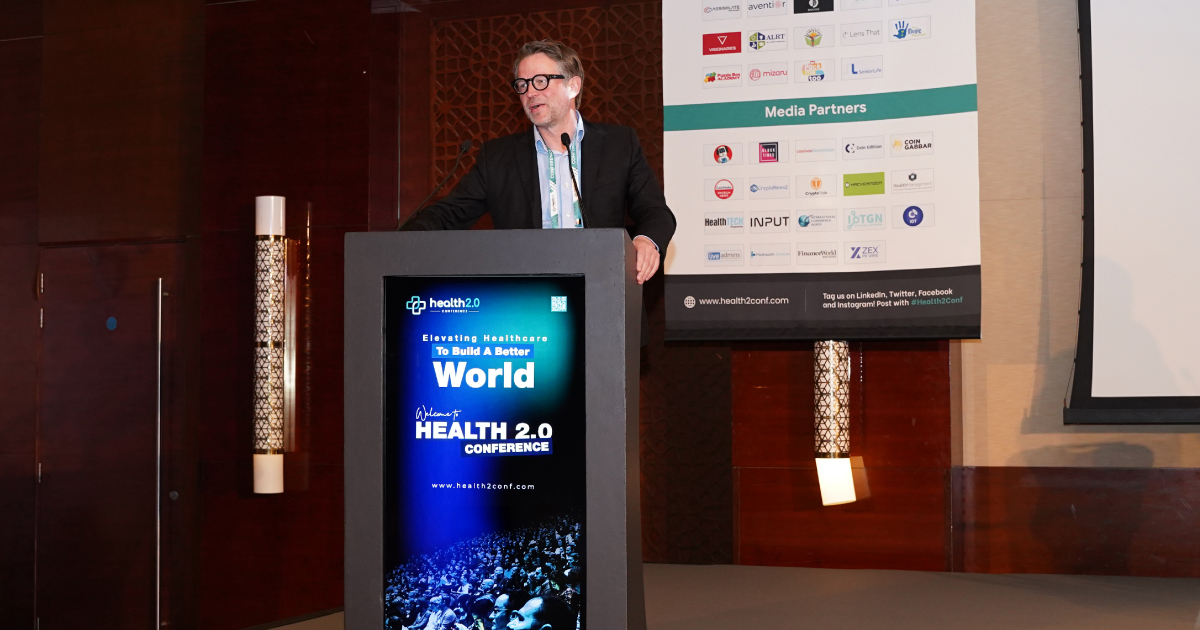Posted on : August 17, 2023

Picture a little superhero inside your body called Vitamin D. It's like sunshine in a pill! This friendly nutrient does so much to keep us healthy, like making our bones strong and helping our immune system work well. But here's the problem: not enough people have enough Vitamin D in their bodies.
In this blog, we'll take you on a journey to understand why health experts believe Vitamin D deficiency is a big deal. Using inferences from smart healthcare conferences, like Health 2.0 Conference, we'll explore how common it is, what causes it, and what health problems it can lead to. We'll also share some expert-recommended tips to make sure you get enough Vitamin D and stay healthy and strong.
What Is Vitamin D And Why It Matters
Vitamin D is a fat-soluble vitamin that plays a crucial role in several important functions within the body. It is unique in that it can be synthesized by the skin when exposed to sunlight, specifically ultraviolet B (UVB) rays. Additionally, it can also be obtained through dietary sources and supplements.
There are two primary forms of vitamin D: vitamin D2 (ergocalciferol) and vitamin D3 (cholecalciferol). Vitamin D2 is primarily obtained from plant sources and is also used in some fortified foods. Vitamin D3, on the other hand, is synthesized by the skin when exposed to sunlight and is found in animal-based foods.
According expert insights at top healthcare conferences, the main functions of vitamin D include:
Calcium Absorption
One of the most well-known functions of vitamin D is its role in facilitating the absorption of calcium and phosphorus from the intestine. This is critical for maintaining strong and healthy bones and teeth.
Bone Health
Vitamin D helps regulate the levels of calcium and phosphorus in the blood, which in turn helps to maintain proper bone mineralization and prevent conditions like osteoporosis and rickets (in children).
Immune System Support
There is growing research indicating that vitamin D plays a role in supporting the immune system. It has been suggested that it helps modulate the immune response and may contribute to the body's defense against infections and diseases.
Cell Growth & Differentiation
Vitamin D is involved in the regulation of cell growth and differentiation. This means it helps control the way cells mature and specialize, which is crucial for maintaining healthy tissues and preventing abnormal cell growth.
Cardiovascular Health
Some studies shared at smart health conferences have suggested a potential link between vitamin D deficiency and an increased risk of cardiovascular diseases, although the exact mechanisms are still being studied.
Mood & Mental Health
There is also evidence suggesting a possible connection between vitamin D levels and mood regulation. Some research has linked low vitamin D levels with conditions like depression and seasonal affective disorder (SAD).
How Common Is Vitamin D Deficiency Worldwide?

Vitamin D deficiency is a widespread concern globally, affecting people of all ages, ethnicities, and geographic regions. According to top healthcare conferences, the prevalence of vitamin D deficiency varies based on factors such as sun exposure, dietary habits, cultural practices, and healthcare infrastructure. Below is an overview of its prevalence according to experts at Health 2.0 Conference, one of the most anticipated upcoming healthcare events in 2024.
High Prevalence In Certain Regions
Vitamin D deficiency is particularly common in regions with limited sunlight exposure, such as northern latitudes and areas with high pollution levels that can block UVB rays. This includes countries with long winters where sunlight is scarce.
Varying Prevalence
The prevalence of vitamin D deficiency can vary widely depending on the population group being studied. For instance, elderly individuals, infants, people with darker skin tones, and those who cover their skin for cultural or religious reasons are more likely to be at risk.
In the United States, data from the National Health and Nutrition Examination Survey (NHANES) indicated that about 40% of the U.S. population had inadequate vitamin D levels based on the recommended levels set by the Institute of Medicine. Whereas in Europe, studies have shown varying prevalence rates of vitamin D deficiency. In northern European countries, the rates tend to be higher compared to southern European countries. Such statistics enable health experts at smart health conferences to study its effects and treatment interventions effectively.
Why Are We Running Low On Vitamin D
There are several factors that can contribute to low levels of vitamin D in individuals. Top healthcare conferences discuss some of the main causes of vitamin D deficiency as below:
Inadequate Sun Exposure
Vitamin D is often referred to as the "sunshine vitamin" because the skin synthesizes it in response to sunlight, specifically UVB rays. People who live in regions with limited sunlight, have indoor lifestyles, or frequently use sunscreen can have reduced sun exposure and consequently lower vitamin D production.
Darker Skin Pigmentation
Melanin, the pigment responsible for skin color, reduces the skin's ability to produce vitamin D in response to sunlight. People with darker skin tones need more sun exposure to produce the same amount of vitamin D as those with lighter skin tones.
Geographic Location
Individuals who live at higher latitudes, where the angle of the sun is lower, have reduced access to UVB rays, especially during the winter months. This can lead to seasonal vitamin D deficiency in these regions.
Clothing And Cultural Practices
People who cover their skin for cultural or religious reasons, such as wearing traditional clothing that covers most of the body, may have limited sun exposure, leading to vitamin D deficiency.
Dietary Factors
While some foods contain vitamin D, it's difficult to obtain sufficient amounts solely through diet. Foods rich in vitamin D include fatty fish (salmon, mackerel, sardines), egg yolks, and fortified dairy products. If these foods are not consumed regularly, it can contribute to deficiency.
Medical Conditions
Certain medical conditions, such as celiac disease, Crohn's disease, and liver disorders, can interfere with the absorption of vitamin D or its conversion to its active form in the body.
Kidney Function
The active form of vitamin D is produced in the kidneys. Individuals with impaired kidney function might have difficulties producing sufficient active vitamin D.
Health Problems Caused By Vitamin D Deficiency
Vitamin D deficiency can lead to a range of health problems and complications due to its critical roles in various physiological processes. According to top healthcare conferences, some of the health problems caused by vitamin D deficiency include:
Bone Health Issues
Vitamin D is essential for maintaining optimal calcium and phosphorus levels in the blood, which are crucial for bone health. Deficiency can lead to conditions such as:
Increased Cardiovascular Risk
Some studies have indicated a potential association between low vitamin D levels and an increased risk of cardiovascular diseases, including hypertension, heart disease, and stroke. However, the exact mechanisms are still being explored.
Mood Disorders
There is evidence to suggest a link between vitamin D deficiency and mood disorders such as depression, anxiety, and seasonal affective disorder (SAD). Vitamin D is thought to influence neurotransmitter production and brain function.
Increased Cancer Risk
Some research has suggested that vitamin D deficiency may be associated with an increased risk of certain cancers, including breast, colon, and prostate cancers. However, the relationship is complex and more research is needed.
Autoimmune Diseases
Vitamin D deficiency has been linked to an increased risk of autoimmune diseases such as multiple sclerosis, type 1 diabetes, and rheumatoid arthritis.
Respiratory Issues
There is ongoing research into the potential role of vitamin D in respiratory health. Some studies have suggested that deficiency may be associated with a higher risk of respiratory infections and conditions like asthma.
Dental Health
Vitamin D deficiency can impact dental health by affecting the development of teeth and contributing to a higher risk of dental cavities.
Cognitive Function
Smart health conferences today share some studies that have explored the relationship between vitamin D deficiency and cognitive decline. Findings suggesting that low levels may be associated with an increased risk of cognitive impairment and dementia in older adults.
Health 2.0 Conference’s Role In Eradicating Vitamin D Deficiency

Given its prevalence today, experts at upcoming healthcare events are expected to share tips to maintain optimal levels of Vitamin D in our bodies. Here is what medical professionals gathered at Health 2.0 Conference suggest to keep a healthy Vitamin D balance.
Sun Exposure
Spend time outdoors in sunlight, especially during the midday when the sun is strongest. Aim for 10-30 minutes of unprotected sun exposure a few times a week, depending on your skin type and location.
Dietary Sources
Include foods rich in vitamin D in your diet. Fatty fish like salmon, mackerel, and tuna, as well as fortified dairy products, egg yolks, and mushrooms, can contribute to your vitamin D intake.
Supplements
If sun exposure and dietary sources are insufficient, consider vitamin D supplements. Consult a healthcare professional to determine the appropriate dosage based on your individual needs.
Balanced Diet
Maintain a balanced diet rich in calcium and other essential nutrients, as they work in conjunction with vitamin D for optimal bone health.
Bottom Line
Health 2.0 Conference plays a vital role in addressing the global vitamin D epidemic by raising awareness and promoting effective strategies to combat deficiency. It provides a platform for experts to present the latest ideas and research in healthcare trends, and brings together professionals from various sectors of healthcare to enable collaboration and networking.
If you want to dive deeper into recent healthcare trends and practices and get a chance to network with renowned healthcare professionals, checking out Health 2.0 Conference’s 2024 agenda is a great idea!











